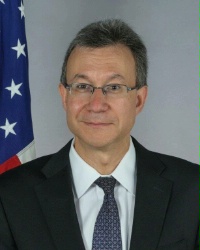U.S. Interests in Central Asia: A Conversation with Daniel Rosenblum, Deputy Assistant Secretary of State for Central Asia
February 29th, 2016
U.S. engagement with the five states of Central Asia—Kazakhstan, Kyrgyzstan, Uzbekistan, Tajikistan, and Turkmenistan—has taken on increased importance as relations with Russia worsen. But domestic developments within these post-Soviet states vex U.S. policymakers as respect for democracy, human rights, and civil society continue to be weak. China’s engagement in Central Asia also highlights the importance of these states to U.S. security and economic interests in the region.
Join the World Affairs Council and the Henry M. Jackson Foundation on February 29 for a discussion on U.S. interests and challenges in Central Asia, and larger implications for relations with China and Russia. Our conversation will be led by Daniel Rosenblum, Deputy Assistant Secretary for Central Asia, Bureau of South and Central Asian Affairs, U.S. Department of State.
This event is part of the 2015-2016 Community Programs Russia and the Surrounding Region Series.
 Daniel Rosenblum is Deputy Assistant Secretary for Central Asia at the U.S. Department of State. Working within the State Department’s Bureau for South and Central Asian Affairs, Mr. Rosenblum oversees U.S. policy towards and diplomatic relations with the five Central Asian states: Kazakhstan, the Kyrgyz Republic, Tajikistan, Turkmenistan, and Uzbekistan.
Daniel Rosenblum is Deputy Assistant Secretary for Central Asia at the U.S. Department of State. Working within the State Department’s Bureau for South and Central Asian Affairs, Mr. Rosenblum oversees U.S. policy towards and diplomatic relations with the five Central Asian states: Kazakhstan, the Kyrgyz Republic, Tajikistan, Turkmenistan, and Uzbekistan.
During 2008-2014, Mr. Rosenblum was Coordinator of U.S. Assistance to Europe, Eurasia, and Central Asia. He was responsible for ensuring the efficient allocation and spending of foreign aid budgets averaging over $1 billion annually. His office provided strategic guidance and oversight for all U.S. foreign assistance to more than 30 countries in the former Soviet Union, the Western Balkans, and Central Europe. He and his team coordinated the efforts of more than a dozen U.S. government agencies supporting economic reform, the development of democratic institutions and rule of law, building the capacity of law-enforcement and other security-sector institutions, and relieving human suffering through humanitarian aid. He also served as the primary U.S. government liaison with other international donors, including the European Union and multilateral development banks.
During 1997-2008, Mr. Rosenblum held a variety of other positions in the Assistance Coordinator's office, including Deputy Coordinator, Director of the Eurasia Division, and Special Advisor for Economic Programs. He played the lead role in developing economic initiatives for several regions of Russia; served as the State Department liaison to 10 U.S.-backed investment funds operating in the region; and was instrumental in designing and implementing large packages of assistance for Ukraine, Georgia and the Kyrgyz Republic following internal upheavals, and for Kosovo following its declaration of independence.
Before coming to the State Department, Mr. Rosenblum spent six years as Senior Program Coordinator at the Free Trade Union Institute (FTUI) of the AFL-CIO. FTUI conducted educational programs and provided technical assistance to labor unions in the former Soviet Union and Eastern Europe. Mr. Rosenblum managed the operation of field offices in Moscow, Kyiv, and Warsaw. While working for FTUI, Mr. Rosenblum also served as a public spokesman for the AFL-CIO on the labor movement in the former Soviet Union, and social problems associated with the transition to a market economy.
During 1985-89, Mr. Rosenblum worked as a legislative assistant to Senator Carl Levin (D-Michigan), where he advised the Senator on foreign policy, human rights, judiciary, trade, and transportation issues. He was deeply involved in legislative efforts around the U.S.-Canada Free Trade Agreement, and helped the Senator promote the interests of his constituents in a wide range of areas, including the competitiveness of the American automotive industry, scrutinizing judicial nominations, protecting veterans’ benefits, and defending international human rights.
Mr. Rosenblum has a BA in History from Yale University and an MA in Soviet Studies and International Economics from the Johns Hopkins School of Advanced International Studies.